In this article:
- Why Wellness Apps Matter for Busy Professionals
- Mindfulness & Stress Management Apps
- Sleep & Recovery Apps
- Fitness & Movement Apps
- Nutrition & Healthy Eating Apps
- Hybrid Wellness & Productivity Apps
- How to Choose the Right App for You
- Conclusion & Final Takeaways
Introduction
The professional world has never been faster, louder, or more demanding than it is today. We live in an age where constant notifications, endless meetings, and the blurred lines between work and personal life make it harder than ever to stay balanced. For busy professionals, the “always-on” culture can quickly lead to burnout, fatigue, and declining productivity—even when you feel like you’re working harder than ever.
The challenge isn’t just managing work; it’s managing yourself within it. How do you find calm in the chaos, squeeze exercise into a schedule that already feels overstuffed, or make healthier food choices when your day is packed with back-to-back deadlines? For many, the answer has come in the form of something already in their pocket: their smartphone.
Wellness apps have become the modern professional’s silent partner. They’re the pocket-sized coaches, nutritionists, meditation teachers, and sleep scientists that help you reclaim control over your day. With just a few taps, you can lower stress, improve focus, optimize sleep, and stay fit—all without leaving your office chair or hotel room. And in 2025, these apps are smarter, more personalized, and more accessible than ever. AI integrations, wearable compatibility, and bite-sized wellness strategies have made it possible to transform well-being even for those who “don’t have the time.”
This article is your curated guide to the top wellness apps for busy professionals in 2025. We’ll break down the best tools across key categories:
- Mindfulness & Stress Management – because your brain needs as much care as your body.
- Sleep & Recovery – the secret weapon of high performers.
- Fitness & Movement – workouts that fit into even the busiest schedule.
- Nutrition & Healthy Eating – smarter choices without the overwhelm.
- Hybrid Wellness & Productivity – apps that bridge well-being and efficiency.
By the end, you’ll have a toolbox of apps designed not just to help you work harder—but to help you live better, stay healthier, and actually enjoy the hustle without burning out.
Because at the end of the day, success isn’t just about what you accomplish—it’s about how you feel while accomplishing it.
Perfect 🔥 let’s roll right into Section 2: Why Wellness Apps Matter for Busy Professionals. This section builds the foundation—why readers should care before we dive into the actual apps. I’ll give you a fully fleshed-out version with stats, trends, and context.
Why Wellness Apps Matter for Busy Professionals
The modern workplace has fundamentally changed. Remote and hybrid work have blurred boundaries between personal and professional life. Laptops sit open late into the night, phones buzz during dinner, and “downtime” often means catching up on more work. For busy professionals, this pace is unsustainable—and the numbers tell the story.
- Burnout is at an all-time high. According to the World Health Organization, burnout is now classified as an occupational phenomenon, affecting millions worldwide. A 2024 Gallup study found that nearly 60% of full-time workers experience frequent stress, with professionals in high-pressure roles reporting the highest levels.
- Productivity suffers. The American Institute of Stress estimates that workplace stress costs U.S. companies over $300 billion annually in absenteeism, turnover, reduced productivity, and medical costs.
- Mental health challenges are widespread. Anxiety and depression have surged since the pandemic, with the World Economic Forum reporting that mental health-related productivity losses could cost the global economy $6 trillion annually by 2030 if left unaddressed.
For professionals, the reality is clear: ignoring wellness isn’t just bad for health—it’s bad for business. A burned-out professional isn’t productive, creative, or sustainable in their role.
This is where wellness apps come in. They’re designed to address the unique challenges of a busy professional’s lifestyle:
- Accessibility in the moment. Whether it’s a five-minute meditation before a client call or a quick workout between meetings, wellness apps make healthy choices available anytime, anywhere.
- Personalization through technology. Many of today’s apps use AI, biometrics, or daily check-ins to adapt routines to your unique stress levels, sleep cycles, or nutrition habits. This means you’re not following a one-size-fits-all plan—you’re getting guidance tailored to your reality.
- Micro-habits for macro-impact. Busy professionals don’t always have an hour to hit the gym or meditate. Apps break wellness into bite-sized, manageable actions—like a two-minute breathing exercise or a desk stretch routine—that build consistency without disrupting your schedule.
- Integration with daily tools. Many wellness apps now sync with calendars, task managers, and wearable devices (Apple Watch, Oura Ring, WHOOP). This allows wellness to blend seamlessly into your workday instead of competing with it.
Finally, wellness apps matter because they remove barriers. Ten years ago, taking care of your well-being might have meant hiring a personal trainer, booking an expensive nutritionist, or carving out large blocks of time for therapy or classes. Today, for the cost of a coffee—or even free—you can access a library of expert guidance, evidence-based routines, and real-time support.
For busy professionals, wellness is no longer optional—it’s the foundation of sustainable success. And in 2025, the right apps make it easier than ever to stay balanced, energized, and focused, no matter how demanding your career gets.
Mindfulness & Stress Management Apps
When deadlines pile up and your calendar feels like a game of Tetris, stress is inevitable. Left unchecked, it chips away at your focus, mood, and even physical health. The good news? Mindfulness apps have evolved beyond simple meditation timers—they now offer on-demand stress relief, guided focus sessions, and even AI-powered check-ins to keep your mental well-being in balance.
Here are the top mindfulness and stress management apps for professionals in 2025:
1. Headspace – The Corporate Favorite
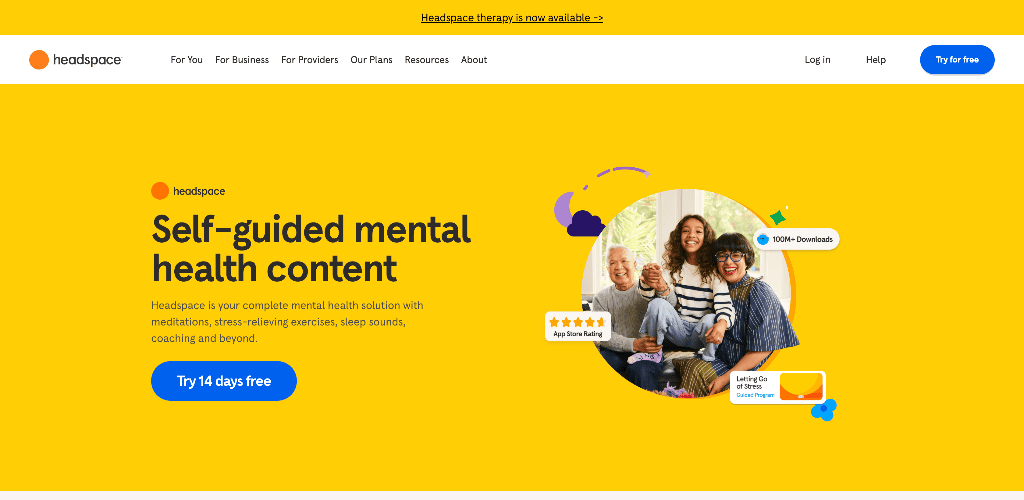
Headspace has become a household name in mindfulness—and for good reason. Originally known for meditation basics, it has expanded into a full-fledged stress management toolkit for busy workers.
- Best for: Professionals looking for structured, science-backed practices.
- Key Features:
- “Mini-Meditations” as short as 1–3 minutes—perfect for squeezing between Zoom calls.
- Focus music and soundscapes for deep work sessions.
- Special “Workplace” programs for leadership, resilience, and focus.
- Integration with Microsoft Teams and Slack for mid-day wellness reminders.
- Why it works for busy professionals: The short practices fit seamlessly into packed schedules, and the corporate-friendly angle means many employers even cover subscriptions.
2. Calm – Stress Relief Meets Sleep Support
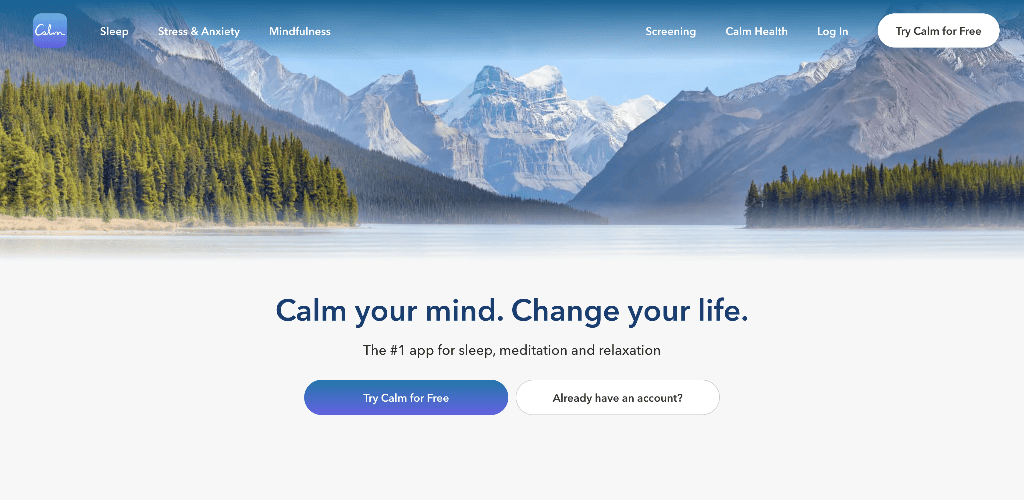
Calm has carved out a niche by blending mindfulness with sleep-focused features. For professionals juggling deadlines, this dual approach makes it a powerhouse app.
- Best for: Professionals who struggle with both daytime stress and nighttime insomnia.
- Key Features:
- Guided meditations and breathing exercises to calm the nervous system.
- Sleep Stories narrated by celebrities (a fan favorite for winding down).
- Soundscapes and nature sounds for focus or relaxation.
- Daily check-ins to track mood and stress levels.
- Why it works for busy professionals: Many workers admit stress doesn’t end when the laptop closes—Calm addresses both ends of the day, helping you sleep better and stay calmer.
3. Balance – The Personalized Coach
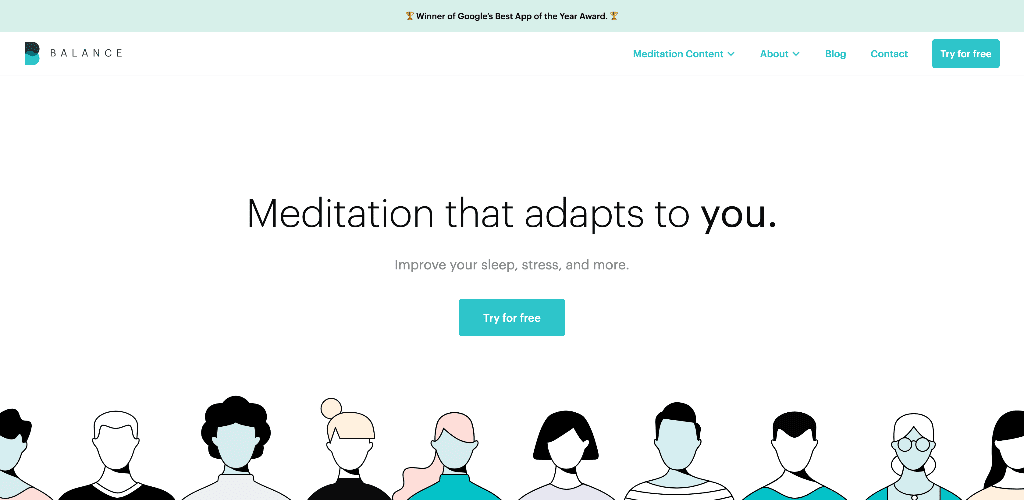
Balance takes a different approach: personalization. Instead of handing you a generic meditation library, it builds a program based on your mood, goals, and past activity.
- Best for: Professionals who want adaptive, customized stress support.
- Key Features:
- Daily check-ins that adjust your meditation style and duration.
- Focus sessions for improving attention span.
- “Energy Boost” and “De-Stress” options for quick relief.
- Year-one subscription often free (a big plus for those testing the waters).
- Why it works for busy professionals: Customization ensures you’re not wasting time on irrelevant content. If you’re anxious before a presentation, you’ll get calming guidance. If you’re sluggish at 3 PM, you’ll get an energizing boost.
4. Insight Timer – The Community Powerhouse
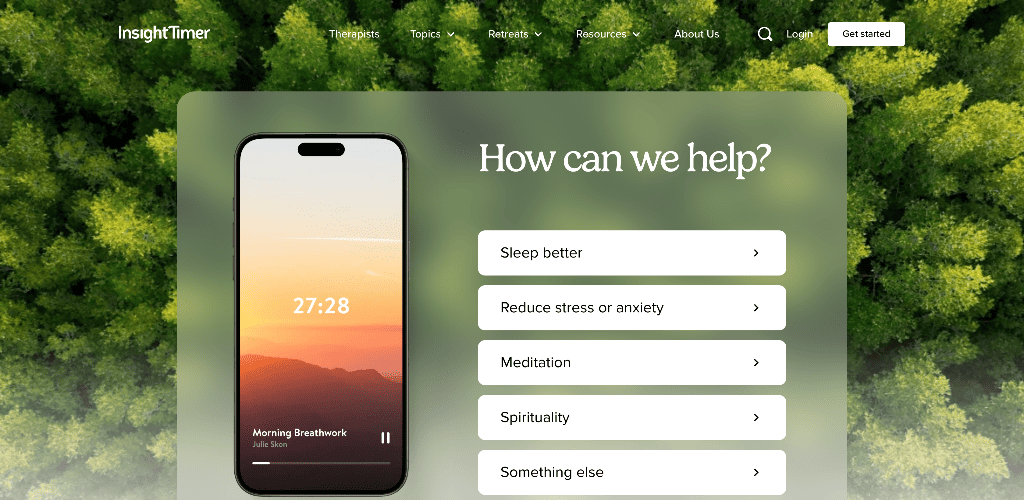
If Headspace and Calm are polished studios, Insight Timer is the bustling global library. With tens of thousands of free meditations, it’s a favorite among professionals who value variety.
- Best for: Professionals who want flexibility without committing to a paid subscription.
- Key Features:
- Massive free library of guided meditations, courses, and talks.
- Live events with teachers from around the world.
- Timer function for unguided sessions (great for experienced meditators).
- Specialized tracks for anxiety, focus, and workplace stress.
- Why it works for busy professionals: The sheer variety ensures you’ll always find something that fits your mood—whether you have 5 minutes or 50. Plus, the community feel reduces the sense of isolation common in remote work.
Pro Tips for Using Mindfulness Apps Effectively
- Stack habits: Pair a 3-minute breathing session with your morning coffee or right before your first meeting.
- Leverage notifications: Let the app nudge you instead of waiting until stress hits.
- Experiment with formats: Not everyone enjoys sitting meditations—try focus music, guided journaling, or breathing exercises.
- Start small: Consistency beats intensity. A daily 5 minutes is more powerful than a 45-minute session once a week.
Mindfulness apps are not about escaping work—they’re about reshaping how you engage with it. For professionals, this can mean the difference between powering through a tough week with clarity or spiraling into exhaustion. And the best part? All of these apps can fit neatly into a schedule that already feels impossible.
Sleep & Recovery Apps
For busy professionals, sleep is often the first thing sacrificed in the name of productivity. Late-night emails, early-morning meetings, and travel across time zones all chip away at rest. Yet research shows that consistently poor sleep impairs memory, lowers focus, and even increases the risk of long-term health problems like heart disease and diabetes.
In 2025, sleep apps have become more advanced—blending smart alarms, sleep science, and AI to help you optimize rest and recovery. These apps aren’t about just logging hours; they’re about improving quality so you wake up refreshed and sharp, even with a packed schedule.
Here are the best sleep and recovery apps for professionals:
1. Sleep Cycle – Smarter Wakeups
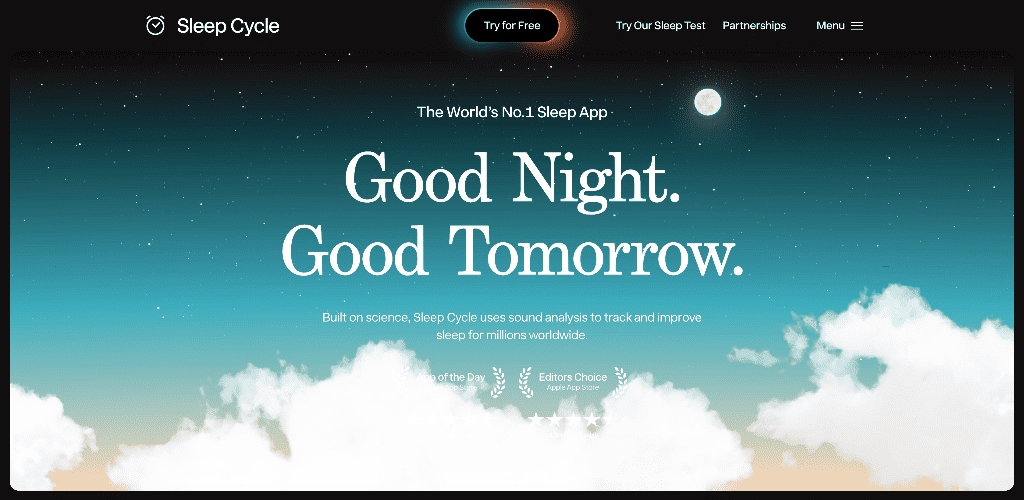
Sleep Cycle has been a top choice for years, and its recent updates make it even better. Instead of jolting you awake with an alarm, it gently wakes you during your lightest sleep stage.
- Best for: Professionals who want to feel more refreshed without changing total sleep hours.
- Key Features:
- Smart alarm that tracks sleep phases and wakes you at the optimal moment.
- Detailed analytics on sleep quality, patterns, and snoring.
- Integration with Apple Health and wearables.
- Journaling features to track habits that affect rest (like caffeine intake).
- Why it works for busy professionals: Even if you only have 6 hours, waking up during light sleep makes those hours feel more restorative.
2. Pzizz – The Power Nap Specialist
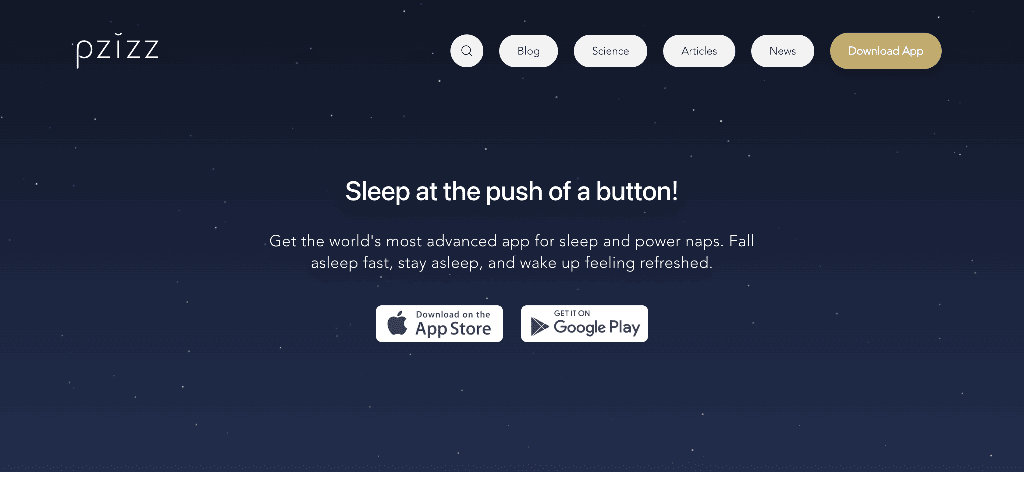
Sometimes professionals don’t have the luxury of a full night’s rest. Enter Pzizz, an app designed to optimize naps and short recovery periods.
- Best for: Professionals who travel frequently or need quick midday recharge sessions.
- Key Features:
- Nap programs (10–45 minutes) that combine soothing voices, music, and binaural beats.
- Night sleep mode for longer recovery sessions.
- Customizable options for background sounds and narration.
- Offline access for travel days or flights.
- Why it works for busy professionals: A well-timed nap can restore focus and reduce errors—perfect for high-demand schedules.
3. Eight Sleep (with App Integration) – Tech Meets Recovery
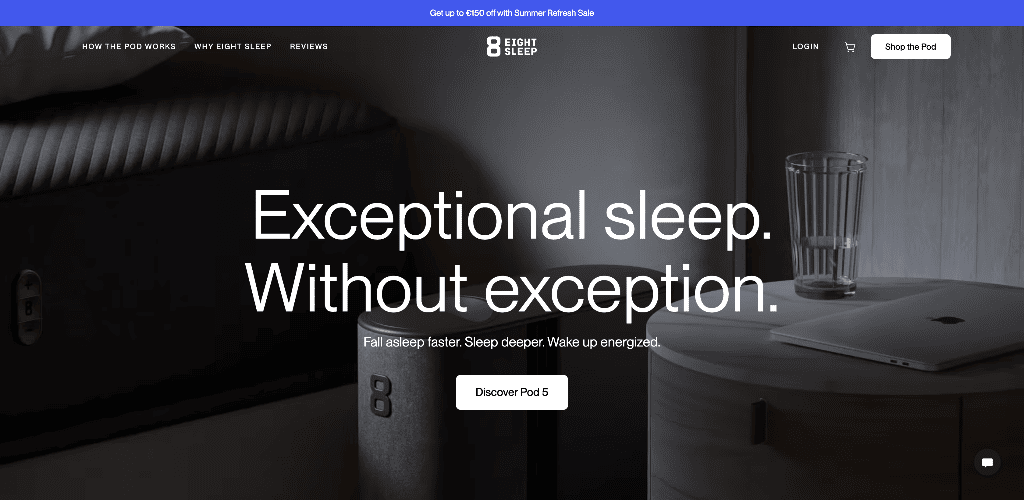
Eight Sleep pairs with its smart mattress, but even its standalone app provides powerful sleep tracking and insights. For professionals willing to invest in tech-driven recovery, this is cutting edge.
- Best for: Biohackers and high-performance professionals who want the ultimate sleep optimization.
- Key Features:
- Temperature-controlled mattress to cool or warm based on body needs.
- Heart rate variability (HRV) and recovery tracking.
- Personalized recommendations based on sleep trends.
- Integration with wearables like Apple Watch, WHOOP, and Oura.
- Why it works for busy professionals: If sleep is your weak spot, this setup actively works to optimize every minute you’re in bed.
4. Loona – Bedtime Decompression

Loona takes a more creative approach. Instead of analytics, it focuses on winding your brain down before sleep—a step many professionals skip.
- Best for: Professionals who struggle with “shutting off” their mind at night.
- Key Features:
- Interactive “bedtime stories” designed to lower stress.
- Relaxing soundscapes and calming art-based exercises.
- Evening rituals to signal your brain it’s time to sleep.
- Why it works for busy professionals: Falling asleep is often harder than staying asleep—Loona addresses this transition with relaxation and mood-shifting techniques.
Pro Tips for Better Sleep & Recovery
- Consistency wins: Going to bed and waking up at the same time helps regulate circadian rhythm.
- Use naps wisely: Limit naps to 20–30 minutes to avoid grogginess.
- Mind the screen: Blue light before bed delays melatonin production—use night filters or avoid screens 1 hour before sleep.
- Pair apps with wearables: Devices like the Oura Ring or Apple Watch can add more precise tracking to your chosen app.
- Don’t overlook environment: Apps are powerful, but blackout curtains, cooler room temps, and a good mattress multiply results.
Sleep isn’t a luxury—it’s a productivity tool. For professionals, prioritizing recovery ensures sharper thinking, better decision-making, and stronger resilience in the face of stress. With the right app, even small improvements in sleep quality can deliver outsized returns in energy and focus.
Fitness & Movement Apps
For professionals chained to desks, fitness often feels like an afterthought. Long hours, travel, and unpredictable schedules make it tough to stay consistent with gym routines. Yet science is clear: even short bouts of physical activity improve focus, reduce stress, and boost long-term health.
The good news? In 2025, fitness apps are smarter, more flexible, and better suited to the needs of busy people. Whether you’ve got 7 minutes at your desk or 30 minutes in a hotel room, these apps make movement accessible anytime, anywhere.
Here are the top fitness and movement apps for busy professionals:
1. Nike Training Club – The All-Rounder
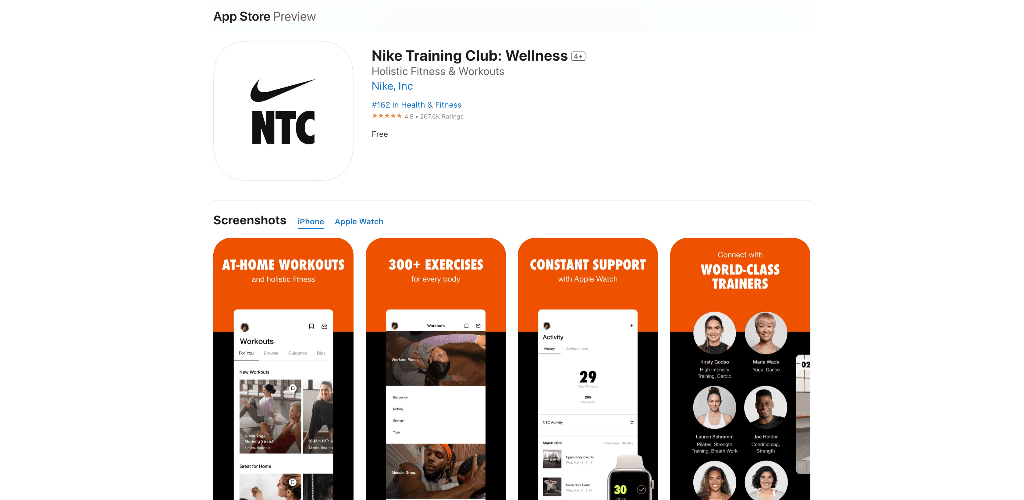
Nike Training Club (NTC) has become a go-to for professionals who want variety without cost barriers.
- Best for: Professionals who want high-quality workouts with minimal planning.
- Key Features:
- 200+ free workouts ranging from bodyweight to strength to yoga.
- Programs designed by professional trainers and athletes.
- Filters for time (as short as 5 minutes) and equipment (including none).
- Seamless integration with Apple Health and Google Fit.
- Why it works for busy professionals: You can pick a workout that fits your schedule—whether it’s a quick desk stretch, a no-equipment hotel routine, or a 30-minute evening sweat.
2. FitOn – Social Fitness on Your Schedule
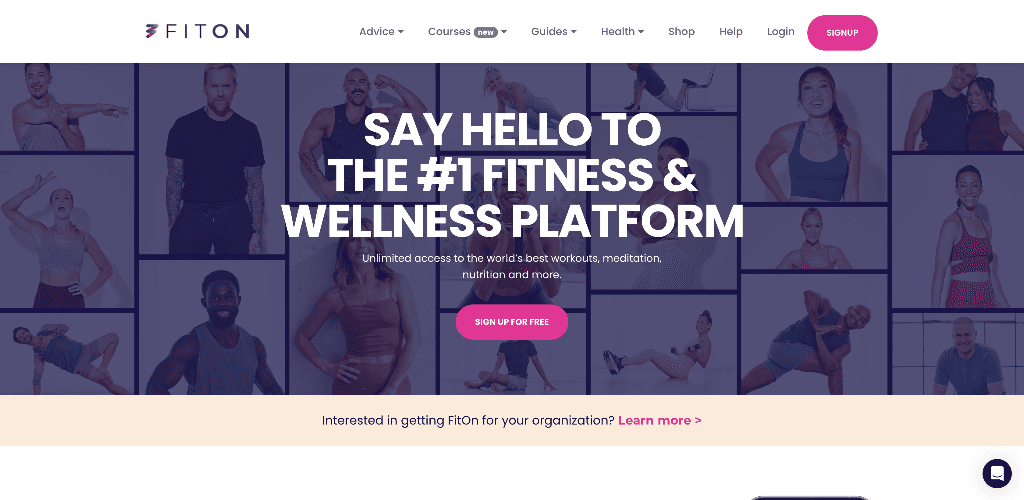
FitOn has carved a niche with its free, engaging workouts and celebrity trainers.
- Best for: Professionals who like variety and motivation from community vibes.
- Key Features:
- Huge library of workouts: HIIT, dance, yoga, Pilates, cardio, and more.
- Celebrity-led classes (Halle Berry, Gabrielle Union, etc.).
- Group workout features to stay accountable with friends or coworkers.
- Completely free, with optional premium features.
- Why it works for busy professionals: The app is flexible enough for quick solo sessions or group challenges that keep motivation high.
3. Centr by Chris Hemsworth – The Premium All-in-One
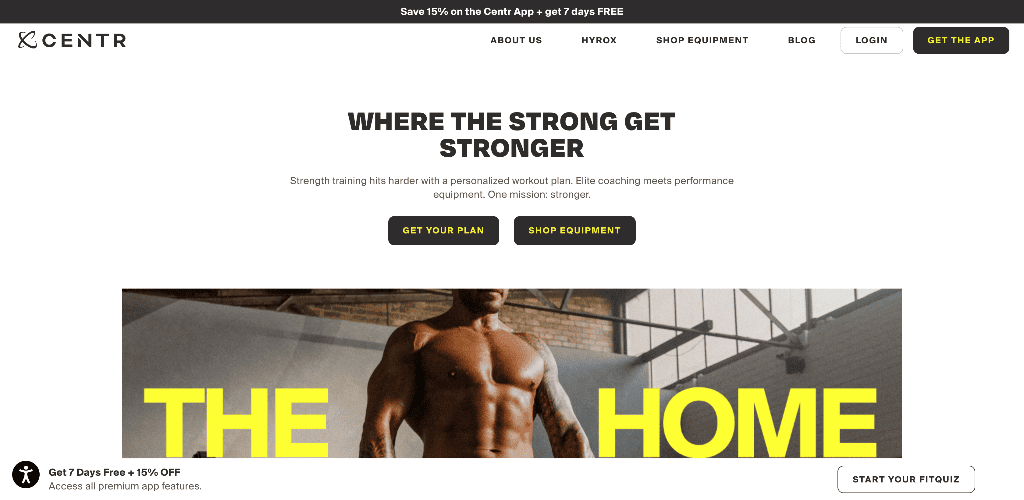
Centr takes a holistic approach—combining workouts, nutrition, and mindfulness into one ecosystem.
- Best for: Professionals willing to invest in a complete lifestyle solution.
- Key Features:
- Daily workout videos (HIIT, boxing, strength, yoga).
- Meal plans designed by nutritionists.
- Meditation and recovery sessions.
- Programs tailored to specific goals (build strength, lose weight, improve energy).
- Why it works for busy professionals: Instead of juggling multiple apps, Centr delivers workouts + food + mindfulness in one platform, saving time and decision fatigue.
4. 7 Minute Workout – The Micro-Solution
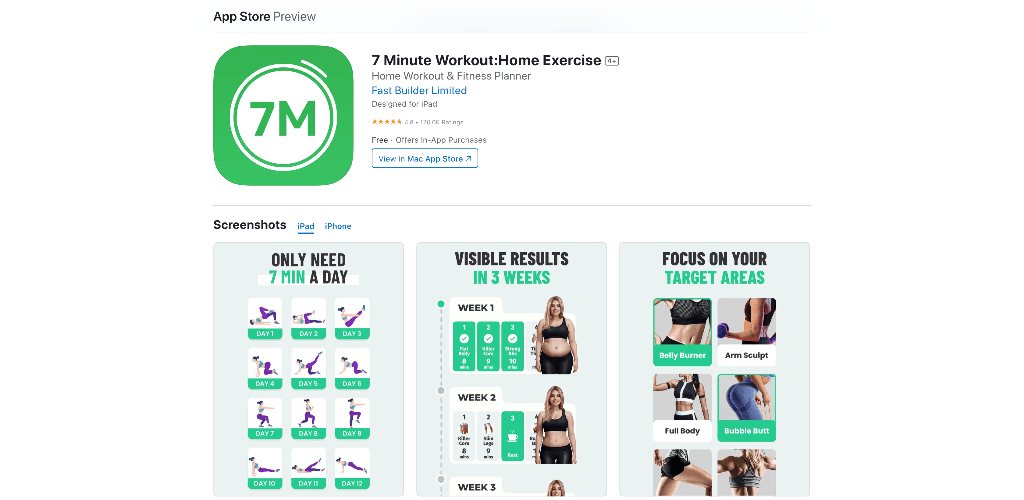
When time is scarce, this app is unbeatable. The “7 Minute Workout” method is science-backed and highly efficient.
- Best for: Professionals who claim they have “no time” to work out.
- Key Features:
- 7-minute HIIT workouts that target major muscle groups.
- Requires only bodyweight and a chair—perfect for office or hotel rooms.
- Visual and audio guidance to keep pace.
- Options to stack multiple circuits for longer sessions.
- Why it works for busy professionals: It eliminates excuses. Seven minutes can fit into anyone’s schedule, and the return on investment is huge for energy and focus.
Pro Tips for Staying Active on a Busy Schedule
- Micro workouts count: Even 5–10 minutes of movement boosts circulation and brain function.
- Desk stretches: Apps like FitOn and Nike Training Club include “desk-friendly” routines—perfect for back pain and posture.
- Travel-proof your fitness: Download bodyweight-focused workouts for hotel stays.
- Consistency over intensity: It’s better to do short daily sessions than occasional long workouts.
- Use reminders: Let your fitness app nudge you when you’ve been sedentary too long.
Movement isn’t about carving out hours—it’s about sprinkling activity into your day. The right fitness app makes it simple, motivating, and sustainable, even for the busiest professional lifestyles.
Nutrition & Healthy Eating Apps
For many professionals, the biggest challenge isn’t knowing what to eat—it’s having the time and structure to follow through. Packed schedules often mean skipping meals, grabbing fast food, or mindlessly snacking between meetings. Over time, these habits drain energy, harm focus, and affect long-term health.
That’s where nutrition apps come in. They simplify planning, tracking, and healthier decision-making, making it possible to eat smarter even when you’re short on time. In 2025, these apps are more powerful than ever—using AI, habit tracking, and even personalized coaching to help busy professionals stay on track.
Here are the top nutrition apps for busy professionals:
1. MyFitnessPal – The Tracking Giant
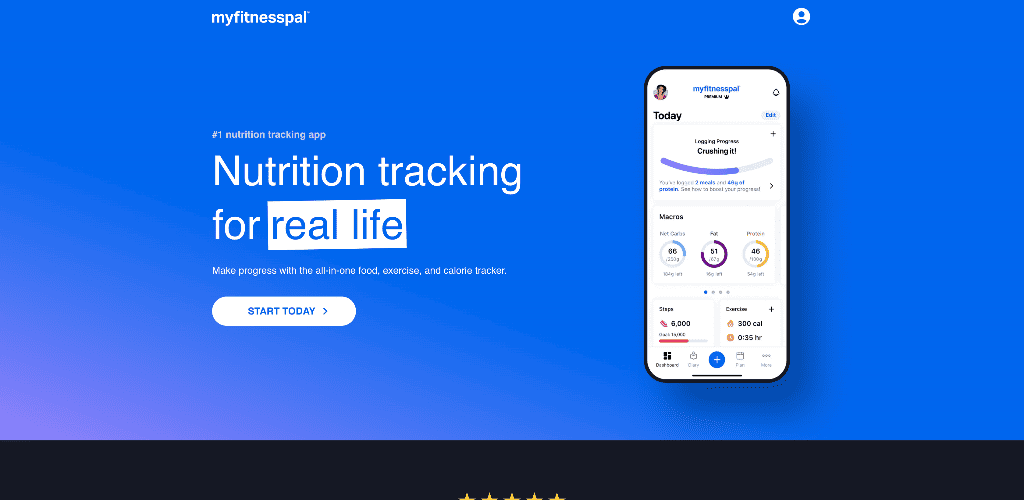
MyFitnessPal remains one of the most popular nutrition apps thanks to its massive food database and simple logging system.
- Best for: Professionals who want precise calorie and macro tracking.
- Key Features:
- Barcode scanner for quick food logging.
- AI-powered meal recognition via photo.
- Integration with fitness apps and wearables.
- Macro and calorie goal customization.
- Why it works for busy professionals: Logging takes seconds, and integrations mean your activity + nutrition sync automatically—no wasted time.
2. Noom – Psychology Meets Nutrition
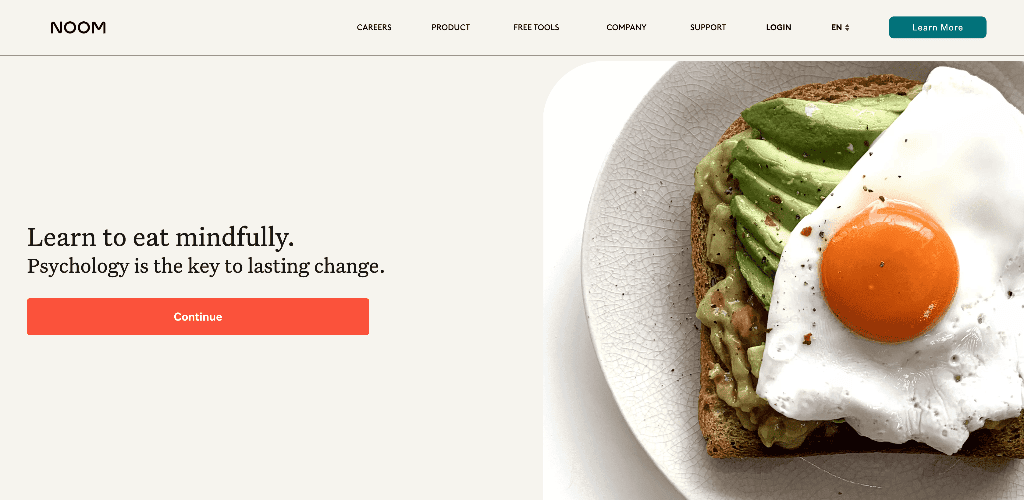
Noom takes a behavior-first approach to eating, blending nutrition tracking with cognitive-behavioral psychology.
- Best for: Professionals looking to build long-term healthy habits, not just short-term diets.
- Key Features:
- Daily “bite-sized” psychology lessons to reshape food habits.
- Food logging with a green/yellow/red system for simplicity.
- Personal coaching for accountability.
- Weight loss and healthy lifestyle programs backed by research.
- Why it works for busy professionals: The focus on psychology makes healthy eating more sustainable than restrictive diets—perfect for people who can’t afford decision fatigue.
3. Lifesum – The Lifestyle Planner
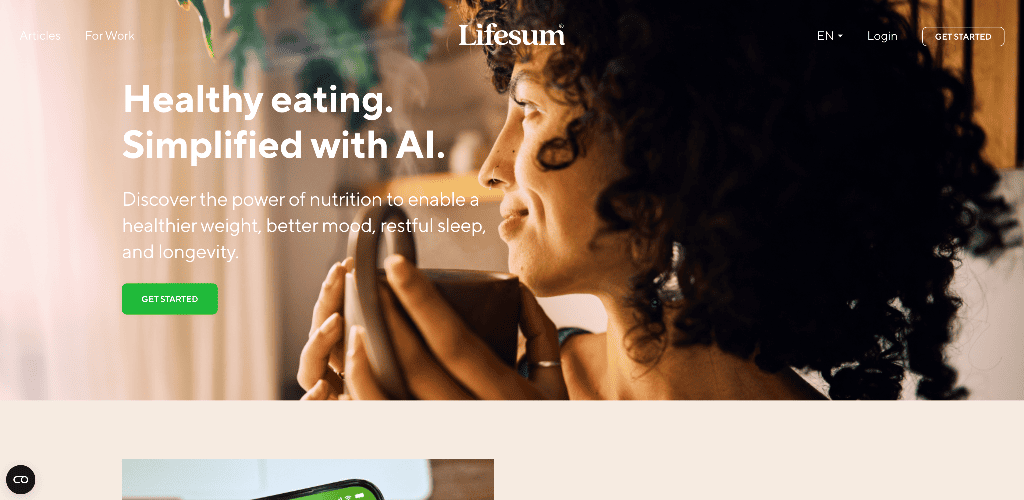
Lifesum goes beyond calorie tracking by offering tailored meal plans and holistic lifestyle tools.
- Best for: Professionals who want guided structure without strict calorie counting.
- Key Features:
- Diet-specific meal plans (keto, Mediterranean, vegan, etc.).
- Grocery list generator linked to your plan.
- Food quality scores to highlight nutrient density.
- Water and exercise tracking for a 360° view of wellness.
- Why it works for busy professionals: Lifesum makes eating healthy as frictionless as possible by planning meals and simplifying grocery shopping.
4. Yazio – The Simple Alternative
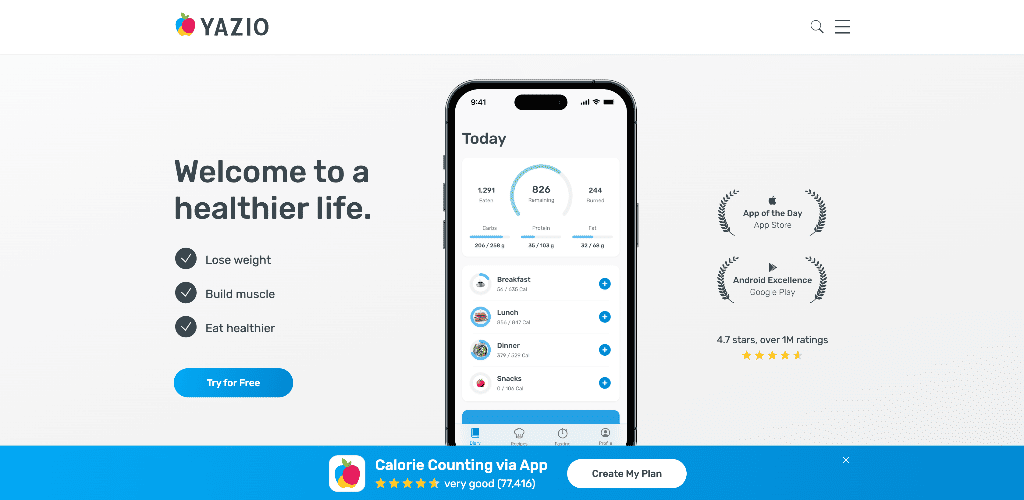
Yazio is gaining traction as a user-friendly alternative to heavier apps like MyFitnessPal.
- Best for: Professionals who want straightforward nutrition tracking without overwhelm.
- Key Features:
- Quick and intuitive food diary.
- Macro and calorie goals tailored to health targets.
- Fasting tracker for those using intermittent fasting.
- Recipe suggestions and meal inspiration.
- Why it works for busy professionals: Its lightweight design makes it easy to use consistently, which is often the biggest barrier to success.
Pro Tips for Eating Smarter with Nutrition Apps
- Batch log meals: Log breakfast or lunch in advance to avoid decision fatigue during busy hours.
- Leverage reminders: Use app notifications to stay hydrated or avoid skipping meals.
- Plan grocery trips: Apps like Lifesum and Yazio make meal planning + shopping easier and faster.
- Don’t obsess over perfection: Consistency matters more than hitting exact macros every day.
- Pair nutrition with fitness apps: Sync MyFitnessPal or Lifesum with fitness trackers for a complete health picture.
Eating well doesn’t require elaborate meal prep or expensive plans—it requires consistency. Nutrition apps take the guesswork out of food choices, helping professionals fuel their bodies and minds for peak performance without adding extra stress to their day.
Hybrid Wellness & Productivity Apps
Wellness and productivity used to live in separate worlds: one focused on work output, the other on self-care. But in 2025, a new wave of apps is blending the two—helping professionals build habits, balance focus with rest, and integrate wellness directly into their daily workflows.
For busy professionals, this is game-changing. Instead of switching between five different apps, these platforms combine habit tracking, reminders, and productivity tools with health-focused features. The result: a smoother routine and less friction in sticking to healthy behaviors.
Here are the best hybrid wellness and productivity apps to try:
1. Fabulous – The Habit Architect
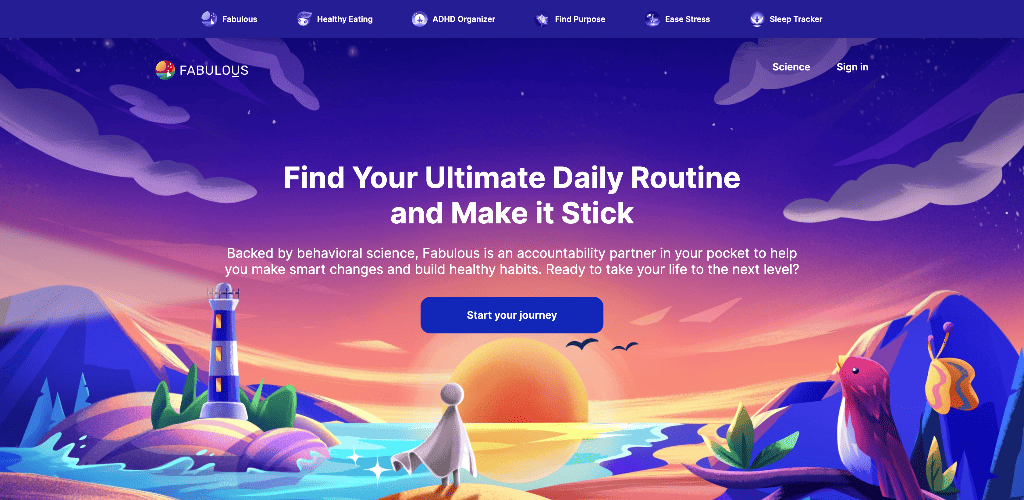
Fabulous takes a behavioral-science approach to habit-building, wrapping productivity and wellness into one engaging package.
- Best for: Professionals who want to design daily routines that stick.
- Key Features:
- Guided habit-building journeys for sleep, focus, nutrition, and exercise.
- Morning and evening routines built into a calendar-like structure.
- Motivational coaching and gamification elements.
- Integrations with reminders and notifications to keep you consistent.
- Why it works for busy professionals: It doesn’t just remind you what to do; it structures when and how to do it—helping you build lasting wellness routines despite a busy schedule.
2. Wellory – Personalized Nutrition Meets Coaching
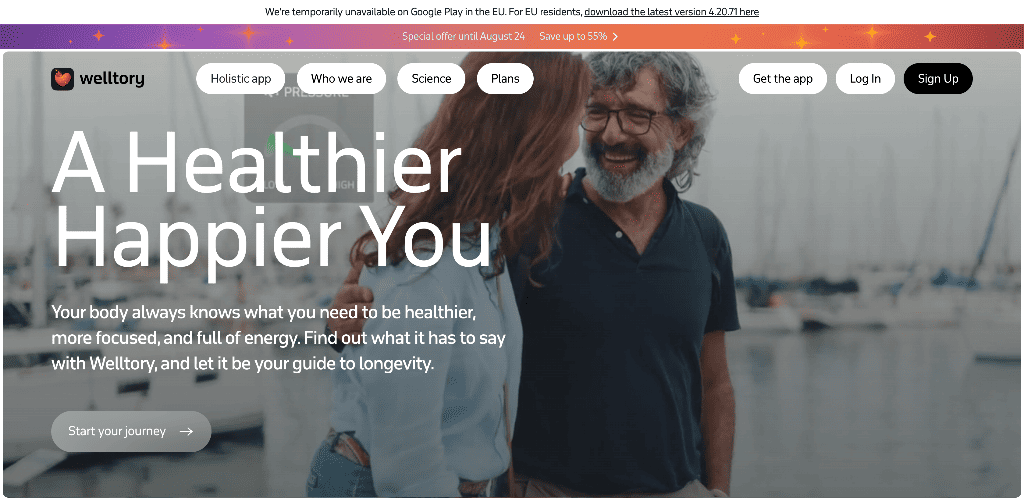
Wellory blends wellness with productivity by pairing users with nutrition coaches who tailor plans to their lifestyle.
- Best for: Professionals who need guidance and accountability in healthy eating.
- Key Features:
- One-on-one nutrition coaching delivered via app.
- Simple food logging with photo check-ins (instead of calorie counting).
- Progress tracking and feedback loops.
- Integration with schedules to align eating habits with workdays.
- Why it works for busy professionals: The accountability factor keeps you on track, while the simplified food logging removes the hassle of micromanaging calories.
3. Notion (with AI Wellness Templates) – The Customizable Option

Notion isn’t a wellness app at its core, but its flexibility makes it a powerful hybrid tool when paired with wellness templates and AI assistants.
- Best for: Professionals who want to manage work and wellness in a single platform.
- Key Features:
- Custom wellness dashboards (habit tracking, meal planning, mood journaling).
- AI integration for personalized daily reflections and planning.
- Ability to link tasks, goals, and wellness metrics in one workspace.
- Syncs across devices for easy access at work or home.
- Why it works for busy professionals: Instead of juggling multiple apps, you can create a centralized hub where work tasks and wellness goals live side by side.
4. Habitica – Gamifying Wellness and Work
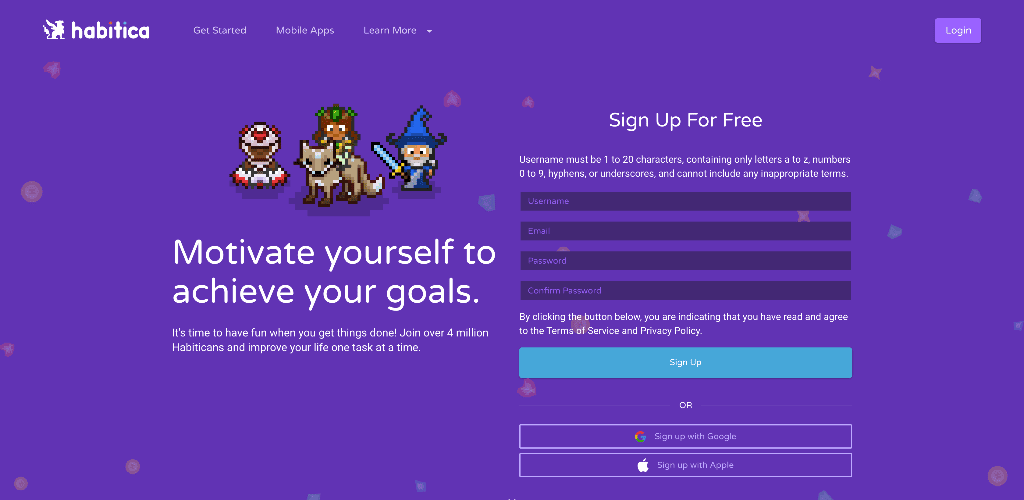
Habitica turns productivity and wellness into a game, rewarding you for completing both work tasks and self-care habits.
- Best for: Professionals who thrive on gamification and accountability.
- Key Features:
- Build an avatar that levels up as you complete tasks.
- Add wellness goals (hydration, meditation, workouts) alongside work tasks.
- Join groups for accountability and community challenges.
- Customizable rewards system to keep motivation high.
- Why it works for busy professionals: Turning wellness into a game makes it fun—and much easier to stick with when motivation dips.
Pro Tips for Using Hybrid Apps Effectively
- Bundle tasks and habits: Pair completing a work task with a wellness activity (e.g., “After finishing report, do a 5-minute stretch”).
- Centralize your data: Use one app (like Notion or Fabulous) as your hub instead of scattering habits across multiple tools.
- Gamify consistency: Habitica or Fabulous can make streaks feel rewarding, which helps with long-term consistency.
- Avoid overloading routines: Start with 1–2 new habits; too many at once can overwhelm even with a good app.
Hybrid apps are the future of professional well-being. They break down the wall between productivity and health, making it possible to work smarter and feel better without juggling endless tools. For the time-crunched professional, this is wellness that finally works with your lifestyle, not against it.
How to Choose the Right App for You
With so many wellness apps on the market, it’s easy to feel overwhelmed. Each promises better health, more focus, and improved balance—but not every app will fit your lifestyle or goals. The secret isn’t downloading them all; it’s choosing the one (or two) that align best with your priorities as a busy professional.
Here’s how to find the right fit:
1. Define Your Primary Goal
Ask yourself: What do I need most right now?
- If you’re constantly stressed and distracted → start with a mindfulness app like Headspace or Calm.
- If you struggle with low energy or irregular sleep → try a sleep-focused app like Sleep Cycle or Oura.
- If you want to get more active in small bursts → go for fitness apps like Seven or FitOn.
- If your biggest challenge is food choices → begin with a nutrition app like Lifesum or MyFitnessPal.
- If you’re looking for overall lifestyle balance → test a hybrid app like Fabulous or Notion.
Clarity about your main challenge will prevent “app overload.”
2. Consider Your Personality Type
The best app is one that matches how you like to work and live:
- Data-driven? Go for detailed trackers (MyFitnessPal, Sleep Cycle).
- Creative and flexible? Use customizable tools (Notion, Yazio).
- Motivated by fun? Pick gamified platforms (Habitica, Fabulous).
- Need accountability? Look for coaching-based apps (Noom, Wellory).
Apps are tools—but motivation comes from alignment with your personality.
3. Check for Integration with Your Devices
Time is your most valuable resource, so choose apps that fit seamlessly into your ecosystem:
- Apple Watch / Fitbit / Garmin users: Look for apps with strong wearable integrations.
- Calendar-heavy professionals: Opt for apps that sync with calendars (e.g., Notion templates, Fabulous routines).
- Travelers: Prioritize offline functionality and cross-device syncing.
An app that integrates smoothly reduces friction and boosts consistency.
4. Think About Time Commitment
Some apps only need a few seconds a day (like hydration reminders), while others ask for deeper engagement (like Noom’s daily lessons). Be realistic:
- If your days are unpredictable → choose lightweight apps like Yazio or Seven.
- If you want structure → go for habit-based apps like Fabulous or Headspace.
Consistency beats intensity. Even small daily actions add up.
5. Start Small—Then Expand
Instead of downloading five apps at once, start with one. Build consistency and see how it fits. Once it becomes second nature, you can expand into other categories.
Example: Start with Calm for stress → add MyFitnessPal later for nutrition → integrate Habitica once you’re ready to gamify.
6. Trial Before Committing
Most premium apps have free versions or trial periods. Test the interface, features, and reminders. If it feels clunky or stressful, it’s not the right fit. Remember: wellness apps are supposed to reduce stress, not add to it.
Pro Tip: Your App Is a Tool, Not the Solution
Downloading an app won’t magically transform your health—it’s your actions that matter. The app is just a coach, a guide, or a system to make following through easier. Use it to support real-world behavior changes, not to replace them.
Choosing the right app is about alignment, not abundance. When you find the tool that feels natural, it becomes less of a “task” and more of a lifestyle enhancer. That’s the sweet spot where real change happens.
Conclusion & Final Takeaways
The modern professional lifestyle is a paradox: while technology has made work faster and more efficient, it has also made it harder than ever to disconnect, recharge, and take care of ourselves. The result? More stress, less sleep, declining focus, and an epidemic of burnout.
But here’s the good news: the same technology that overwhelms us can also empower us. Wellness apps are no longer “nice-to-have” gimmicks—they’re practical, science-backed tools designed to help you build resilience, balance, and performance in the middle of a hectic schedule.
Throughout this guide, we’ve explored the best wellness apps of 2025 across five key categories:
- Mindfulness & Stress Management Apps – to calm your mind and sharpen focus.
- Sleep & Recovery Apps – to give your body and brain the rest they need.
- Fitness & Movement Apps – to keep you active, even on your busiest days.
- Nutrition & Healthy Eating Apps – to simplify smarter food choices.
- Hybrid Wellness & Productivity Apps – to integrate self-care directly into your workflow.
The truth is, you don’t need all of them. You just need the right one for where you are right now. Whether that’s finding calm with Headspace, improving your nights with Sleep Cycle, sneaking in quick workouts with Seven, or gamifying your habits with Habitica—what matters most is that you take the first step.
Final Tips for Busy Professionals:
- Start small: Don’t overwhelm yourself by trying to optimize every aspect of wellness at once. Pick one app, one habit, and build from there.
- Focus on consistency over intensity: A 5-minute meditation done daily beats a 1-hour session done once a month.
- Use tech as an ally, not a crutch: The app is your guide, but the real work happens in your choices and actions.
- Check in with yourself regularly: Every few weeks, ask, “Is this app still serving me?” If not, pivot.
At the end of the day, wellness isn’t about being perfect—it’s about building small, sustainable practices that protect your health, fuel your performance, and allow you to enjoy the rewards of your hard work.
If you’re a busy professional, your schedule may feel out of your control. But your wellness doesn’t have to be. With the right app in your pocket, you can take back that control—one breath, one stretch, one healthy meal, one mindful break at a time.
Because true success isn’t just about climbing the ladder—it’s about having the energy, focus, and peace of mind to enjoy the view once you get there.